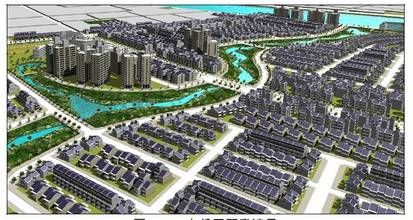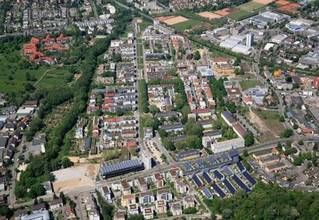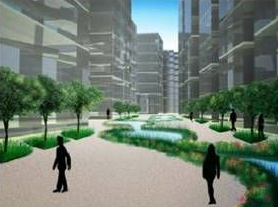
Ecological city where man and nature are harmonious
Establish a Sustainable Ecological City
Eco-city refers to a healthy eco-city and integrates economic, social and natural systems into a high-quality, low-impact life. The purpose of the eco-city is to protect the environment, prevent pollution and pursue the beauty of the natural environment. It emphasizes that man and nature can maintain a dynamic balance. Eco-city is a process of continuous development. Its conceptual mode of development has three related elements: stage of development (planning, design, construction, operation and reconstruction); resources (energy, water resources, materials and land); principles (reuse, reduce, recycle, nontoxic, high quality). Build an eco-city through reduce, reuse, recycle, which is a 3R phased development. Register (1987), president of the Urban Ecology Association of Berkeley, California, suggests that eco-city refers to a city that combines ecology and health. Register believes that by increasing the city's fruit trees and garden area, using more walking, cycling or mass transit, and even more concerning about resource consumption and environmental pollution, we will move closer to the concept of eco-city and the future will be more healthy and beautiful. Therefore, Register believes that taking action on nature is the most important eco-city concept.

Ecological city where man and nature are harmonious
Urban Planner Ebenezer Howard was the earliest urban planner to come up with an eco-point of view. He published "Garden Cities of Tomorrow Tomorrow" in 1902. In response to the emerging problems of rapid urbanization in the United Kingdom, such as traffic jams, declining environmental quality and the influx of peasants into cities, he proposed a new city plan. The allocation principles of residential districts, green spaces, boulevards and public facilities have an important enlightenment on the concept of "eco-city" and have also specifically affected the development of new towns in the United States in the twentieth century. Some people today also promote the use of renewable energies such as solar and wind energy, waste recycling technology, river rehabilitation, and the replacement of cars, bicycle and public transport by foot. Hope to create a symbiotic environment of the city through the proposed eco-city. However, the rapid metropolitan development in Taiwan has violated ecological principles in recent decades. Improper development and destruction of ecology, over-reliance on fossil fuels and pollution of the natural environment make mankind increasingly concentrated away from eco-cities.

Eco-city needs continuous and complete planning.
Eco-City's perspective comes from the realization of Sustainable Development. In 1971, UNESCO proposed a definition of Biosphere Reserves, which is using ecological methods to study the relationship between people and the environment, provide comprehensive norms for the conservation and rational utilization of resources and ecosystems, and study the impact of human beings on the biosphere through long-term systematic monitoring and provide Effective personnel management and exchange of information on the effective management of natural resources in the biosphere. This concept of "urban ecology" refers to putting forward discussions on the social, economic activities, natural climate and ecological issues in human cities, opening up the research and development of follow-up eco-cities and arousing international attention to the ecological environment. Many countries have included the construction of eco-city into their national development policies and plans.

Urban development must take into account the sustainable development.
Reference:
Guo Rujun, "Study on a Happy and Liveable Eco-city", Taichung City Hall, 2013.
Images from:
Regional Development Institute, Research Center for Regional Economic and Metropolitan Development of National Kaohsiung University, Case Study on Entrusted Professional Services for Eco-city Urban Design and Operation Manual, Construction and Planning Department, Ministry of the Interior, 2010.
Zhang Yulong and Xie Mincheng, ecodesign Principles, ecology, architecture, energy efficiency and renewable Energy Community Design Case in Denmark and Germany, Urban Development Bureau of Taipei City Government, 2008.
- Top -
© Copyright 2018 Taipei Municipal Daan Elementary School - All Rights Reserved